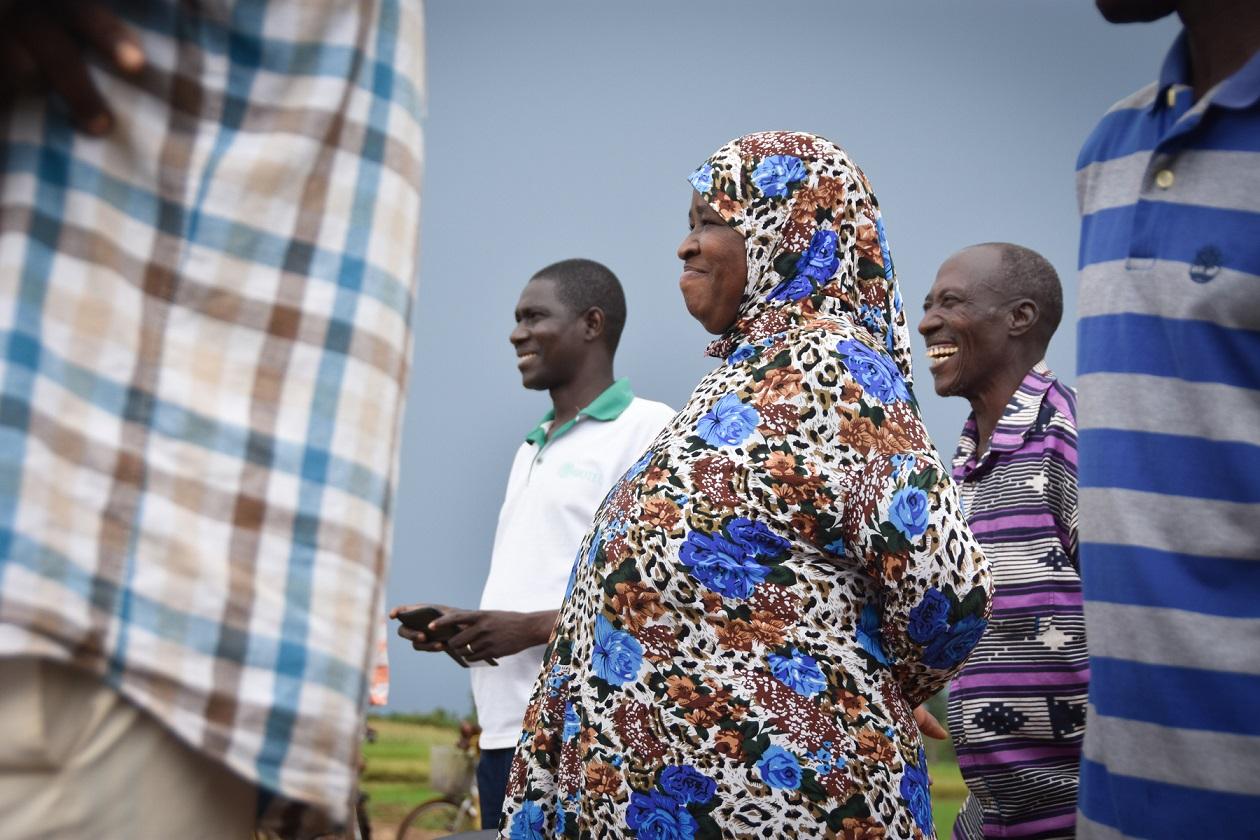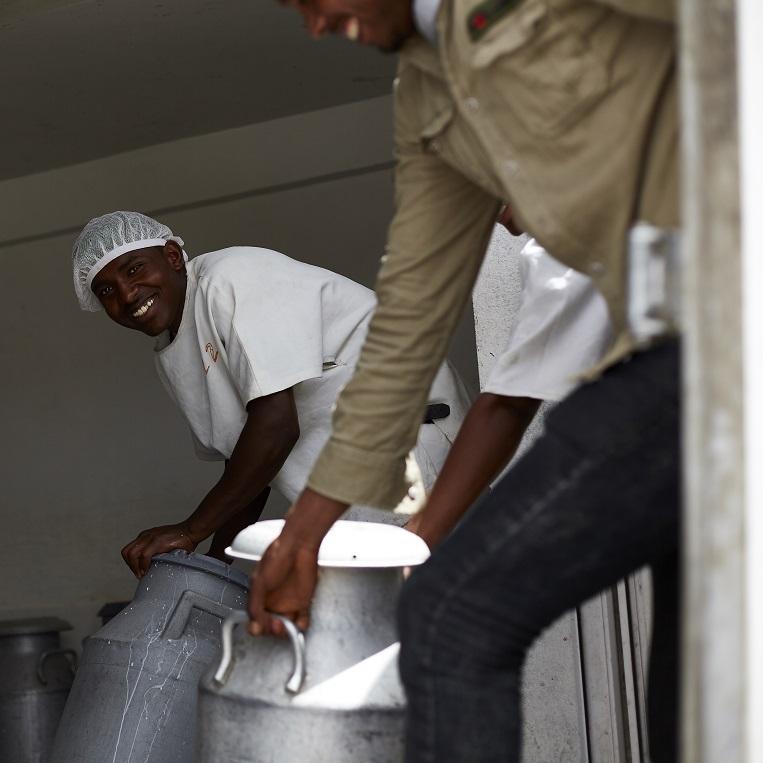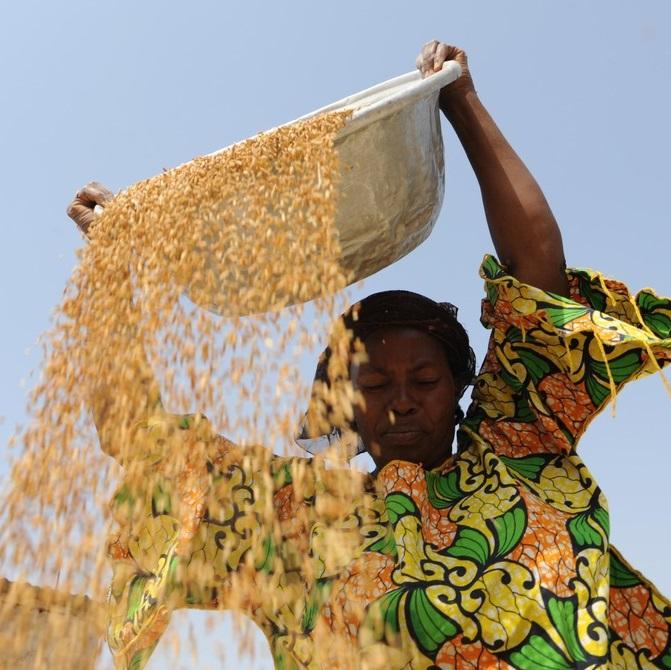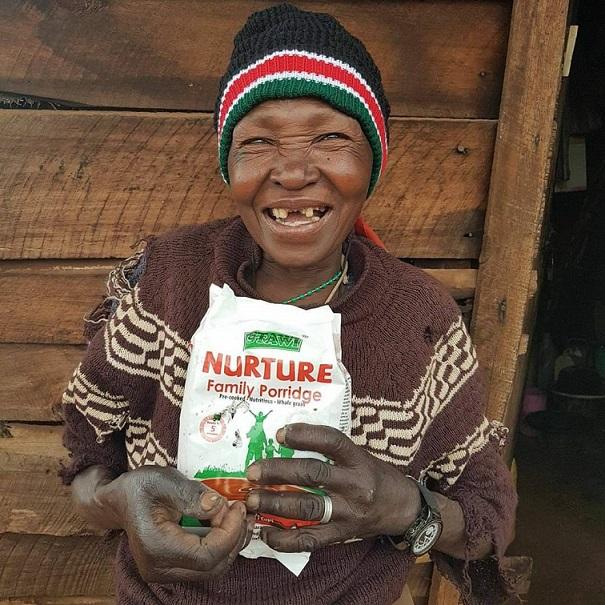New models for producing food are critical
Sustainable solutions such as modular greenhouses and hydroponics use less land and resources for climate resilient growing
Import substitution increases resilience to shocks
Harnessing technology can address inefficiencies in farming and provide better incomes
Inclusive models lead to increased outputs
Partnerships allow sustainable business models to be shared globally
New models for producing food are critical.
Our traditional models of food production and supply chains are vulnerable to a growing wave of shocks. Bomi Fagbemi, founder of the waste-to-value business Bioloop in Nigeria, gets to the heart of the matter: “Our population is exploding and the cost of food and cost of producing food is rising. So we need some solutions that change the way our society functions a little bit. We can't keep having this linear production model.”
Potential solutions to this growing crisis include diversifying food crops, utilizing less land and soil through vertical and hydroponic growing systems, and finding innovative ways to reduce the need for imported food. For example, Bioloop uses black soldier flies to turn waste into animal feed and fertilizer, thereby reducing the need to use imported feed. “We’re aiming for import substitution because our product is a substitute for soy, fish meal, and maize in animal diets. And soy and maize are things you can use to feed human beings. Competing with animals for nutrition, especially in a country where malnutrition is a problem, is to me a bit silly.”
Bioloop turns waste into animal feed.
Hydroponic farming can also provide an alternative to soil-based farming, also helping urban communities with less space to grow their own food. For example, Hydroponic Farms Uganda empowers mainly urban farmers to achieve predictable and highly nutritious yields for vegetables at limited cost of input.
“Eighty million small farmers in India LOSE money on average from agriculture,” says Kaushik, co-founder of Kheyti, an inclusive business that has developed the "Greenhouse-in-a-Box", a modular greenhouse bundled with end-to-end services that is affordable for smallholder farmers and covers just 1/10th acre. This model enables farmers to produce seven times the yields using 1/50th the water per kilogram when compared to traditional cultivation and helps them battle income variability.

Many Indian farmers make losses.
Farmers often face inefficiencies that leave them losing out to middlemen. Omnivore, an impact investing firm in India, is seeking out and investing in businesses that provide new and innovative solutions for farmers. Jinesh Shah, Managing Partner, explains how technology can level the playing field: “A digital B2B agri marketplace has the power to provide stakeholders with better chances of price discovery, more information symmetry, access to alternate channels of business, access to organized credit, logistics, better quality inputs, advisory, and several other aspects. All these features can vastly improve farmer prosperity and access to affordable nutritious food for all.”
Technology can save valuable time for urban farmers as well; Hydroponic Farms Uganda uses Internet of Things technology to automate their services. “The introduction of IoT has allowed farmers to automate the hydroponic culture and easily control the gardens on their mobile phones using our mobile application and web application. And all this is in real time,” Amon Mahikaho, their Head of Operations, told us. It has also enabled scaling through registering patents and selling software and hardware to different farmers, thereby winning prizes and grants.

Omnivore invests in agritech companies like TartanSense.
Making invisible labour more visible can reduce hunger. Drawing on her own research in Liberia, Sabine Garbarino explains how gender data can be used to support inclusion in agriculture, resulting in higher outputs and thereby reducing food insecurity. “Our data told us that around 60 per cent of Liberia’s vegetable farmers are women. Yet, on average, women made up well under a third of the client base of Liberian agro-dealers. This large, untapped market provided a perfect entry point to discuss with our partners how they could grow their client base and boost turnover by more actively reaching out to female farmers,” she shares in her article, Closing the gender data gap to drive inclusive agricultural development. Including women drove input sales to female farmers to grow by 248 percent (compared to a 73 percent growth for male farmers). Providing women with increased access to farming inputs and markets can boost food production and incomes for farming families.

Trainings should be inclusive.
Partnerships can also provide new innovative supply chain models that can be used in other countries. In her blog, Charlotte Sørensen, Senior Project Manager at Arla Foods Ingredients, explains how Arla embarked on a collaborative project to develop a sustainable dairy supply chain in Ethiopia, working with local dairies to provide a nourishing and affordable yogurt product. This model has the potential to be adopted in other regions. “We have already shared the model with the Scale-Up Nutrition (SUN) Business Network, which is currently working on a revised version in collaboration with a dairy in Pakistan,” she writes.
Networks such as Nourishing Africa provide innovative businesses with support to scale and learn from others. Nourishing Africa is a digital knowledge and membership hub that supports African agri-food entrepreneurs to scale their businesses through collaborative models, peer-to-peer support, and provision of critical resources, tools, and opportunities. Ify Umunna, Co-CEO of Nourishing Africa, expresses in her editorial the need to empower small businesses: “I hope that the ongoing conversations on food security lead to the direct support for SMEs, mainly through financing, market linkages, mutually beneficial partnerships, and conducive regulations and environments for their agribusinesses to thrive, ensuring that we can truly become food secure.”
According to Lesley Mitchell and Charlene Collison of Forum for the Future, “The challenge for business is thus to help innovations evolve in ways that are just and accessible to all types of farmers, and critically, engender new mindsets around stewardship and partnership with nature, rather than creating just incremental add-ons to existing extractive practices.”
Some businesses are well on their way already, fostering inclusion and sustainable practices and providing a model for others. When asked about his future plans, Eric Muthomi of Stawi Foods replied: “In five years, we plan to be in a position to feed one million children every single day, in partnership with food distribution partners. We plan to have a sustainable supply chain that puts farmers first, and to support them with the technology they require to grow food using less resources to counter climate change.” These are the business goals that can support a sustainable future for food.

Some are already on their way.
- FAO, The State of Food Security and Nutrition in the World 2021
- Reliefweb, "Hunger Hotspots"
- International Food Policy Research Institute, COVID-19 and global food security: Two years later
- Think 7, "Sustainable and Resilient Agricultural Value Chains: Addressing Multiple Vulnerabilities with a new Partnership Approach"
- Bloomberg, "Soaring Prices Are Changing the Way People Eat"
- BBC, "The foods that could prevent climate disasters"
- Reuters, "With Ukraine farmers on frontlines, U.N. food chief warns of 'devastation'"
- Bloomberg, "Soaring Prices for Everything in the Food Supply Chain Means More Inflation"
Photo credits:
- Header: © Arla Food Ingredients, © Stawi Foods, © GIZ/Ursula Meissner
- Main text (from top): © GIZ/Thomas Imo/photothek.net,
© GIZ/Thomas Imo/photothek.net, © GIZ/Ranak Martin,
© Omnivore, © GIZ/Aude Rossignol, © GIZ/Aude Rossignol



